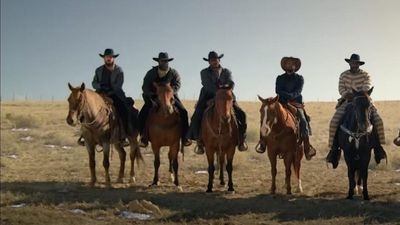Netflix's 'The Harder They Fall' Is A Much-Needed Western But Underwhelming Film
The Harder They Fall, one of the few Westerns with an all-Black principal cast, is a film devoted to the traditions of its whitewashed genre. In its attempt to correct Hollywood’s erasure, the film chooses style over content, revealing how whiteness limits Black imagination.
Netflix’s determined new Western, The Harder They Fall — in theaters and streaming now — opens with a lighthearted hard fact. White lettering on a black background proclaims: “While the events of this story are fictional... These. People. Existed.” It’s the film’s essential, if not only, purpose — to highlight the forgotten color of the Old West.

From the early 1900s to the late '60s, Westerns were a dominant staple of America’s film industry, always reemerging whenever our country needed a dose of imperialist pride. Grossly missing from the silver screen was the quarter percent of Black cowboys who lived and experienced the American frontier. The Harder They Fall commits itself to reshaping the American image of cowboys by rectifying Hollywood’s long-standing historical erasure of their Black contributors.
Over two beautiful but dragging hours, Jeymes Samuel uses his directorial debut to recite a blood-spattered epic of revenge in a no-longer whitewashed Wild West. Despite an investment in reality — several characters in the film’s star-studded ensemble cast like Nat Love (Jonathan Majors), Bass Reeves (Delroy Lindo), Rufus Buck (Idris Elba), and Cherokee Bill (Lakeith Stanfield) share a namesake with real life historical figures — The Harder They Fall falls somewhere closer to Black magical realism. Born from the traumatic murder of his God-fearing parents by an anonymous outlaw (who is revealed shortly after to be Buck), Love devotes his life to avenging them. In true Western fashion, it’s an obsession with revenge so pervasive that it drives a wedge between Love and his leading lady, Mary Fields, portrayed — controversially so — by Zazie Beetz.
After a tense reconciliation at Fields' saloon, wherein Love meets Cuffee — an immediate and perpetual scene-stealer portrayed by Danielle Deadwyler — he assembles a charismatic band of thieves featuring the talents of Edi Gathegi (who plays Bill Pickett as a no-nonsense sharpshooter) and RJ Cyler (who plays Jim Beckwourth as a quick-draw specialist). With electric chemistry and Friday-levels of humor, the Nat Love Gang travels among scintillating mountain ranges and frontier towns so vibrant that it feels unmoored from reality. (This film could be rebranded as a large visual album and make the same amount of sense.) Isolated in the Western archetypes of their characters, each gang member transcends their setting to co-exist in an untethered but infinite new reality. It is the Old West, but it’s the Old West dotted with bright stars as never been seen before.
The mythos of the Old West lives again in Love’s larger-than-life presence. With a cross etched into his forehead, he’s a marked man: one who figuratively and literally brings grief everywhere he goes. Majors delivers a phenomenal performance with a pliant gravitas perfectly suited to the surreal world he’s found himself in, an approach he utilized in 2019’s The Last Black Man in San Francisco and 2020’s Lovecraft Country. Cementing Majors’ leading man status is his ability to go toe-to-toe against Elba, who performs his tragic and morally ambiguous character with unbridled confidence. With complimentary chips on their shoulders, Love and Buck are established as mirror images of each other with matching crews. Rounding out the film’s stellar ensemble cast is Regina King with an impossible-to-pin-down accent as the perpetually sneering Trudy Smith. As is expected from the villainous Buck’s right-hand, Smith is ruthless, prone to violence, and outrageously addictive. Slightly lower on the ladder is Buck’s cheat of a quick-draw, Cherokee Bill. Stanfield portrays the infamous outlaw with a decidedly Shakespearean and uneasy humor.
For such an evenly-matched and talented cast, there’s little story for them to bring to life. Still, they’re far from underused. A heavily-penned script awards each actor multiple opportunities to flex their chops by volleying impassioned one-liners back and forth before the meat of the scene — gratuitous violence — can take place. It’s a film with beautifully-shot and tightly-scored (but isolated) scenes that lead to an underwhelming third section.
With a not-so-shocking twist reminiscent of the tale of Cain and Abel, the heart of the film waits to fully disclose itself until its last 20 minutes. A tense standoff reveals that Love’s preacher father used to be Buck’s abusive, alcoholic father, and that Buck murdered the evolved patriarch for killing his mother and abandoning him. From a pool shallow in characterization and emotional gravitas comes forth a wholehearted play at empathy. This is a story of generational trauma: a Black family divided and haunted by its past, destined for the cycle of violence to continue. Even though these characters are based on real historical figures, this plot point is the first semblance of reality that shines through The Harder They Fall’s dazzling prism.
In that shining veneer, white supremacy nearly disappears. For the most part, the film’s Black heroes and anti-heroes are heralded without the limitations of whiteness. However, once the viewer is reminded of whiteness’ historical violence, its stylized liveliness becomes harder to keep up with. The film ends with a return to reality: Black stories have been stolen, filtered, and resold for profit. The Harder They Fall wants a seat at the table and attempts to reclaim narratives stolen from Black cowboys. It results in an isolated, pseudo-raceblind film that prioritizes aesthetics over content, limiting the expansiveness of its Black talent. As a Western, it’s a much-needed truth, a major credit to an ever-evolving genre. As a film, it’s a slow burn masquerading as an explosion.
—
LaTesha Harris is a writer, producer, and reluctant talking head from Texas who currently resides in Chicago. She has written for NPR, Bitch Media, Variety and Chicago Reader. She can be found on Twitter.

